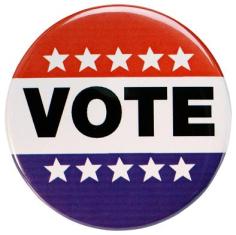Politics is my Olympics. It’s like a Super Bowl in which we can all participate. I don’t follow sports very well, but I look forward to the circus that happens in this country once every couple years. This year’s final act has been a roller coaster ride.
Today is a special day. It’s a day when those of us who follow politics finally get to read the last page of the chapter we’ve been reading nearly exclusively for more than the last two years. Today, each state selects from among a subset of a large number of candidates for President of the United States in this election year of 2008.
How does this information relate to auctions or technology? The next president will have the ability, if not a perceived mandate, to make what could be drastic changes from our economy to foreign relations to the environment to national defense to our military involvement around the world. All of these issues are important, but they’re outside the scope of this blog. Our presence on the world stage is tightly integrated with the technology industry. That industry is directly tied to science.
How many times has public perception changed during the course of the last few thousand years? How many empires have risen? How many forms of government have been devised? How many fluctuations have we seen in mores? How many republics have failed?
All of the answers to the above questions are influenced, at least in part, to the sum of the knowledge of the human race. As time moves forward, we know more about the world. This accumulated knowledge, with a few exceptions, certainly molds new political ideas. Knowledge pulled us, perhaps kicking and screaming, out of the dark ages when, as the general public became more well-informed, they threw off the fetters of abstract, dogmatic teachings in favor of an empirical reality that better matched what they observed. When the church said one thing, and people observed another, the domain of the church – the unexplained – grew smaller. As we learn more, our knowledge becomes the basis of new beliefs as these new beliefs replace the outdated, older beliefs. Note the difference between knowledge and beliefs.
While science can be wrong, it is self-correcting. Any time science is found to be incorrect, the hypothesis is modified and retested. Once a hypothesis has been tested and found by many different, unrelated scientists to hold true under all conditions, it becomes a theory.
Some politicians don’t understand what a theory is. A theory is the closest science can come to fact. A theory is really a collection of facts that describe a phenomenon. Many politicians preface the term evolution with theory of in an effort to discredit it. They don’t understand that they’re validating it in they eyes of anyone who understands the scientific method. It’s like talking about the theory of gravity or the theory of relativity as if they haven’t been found to hold true in our tests.
There are a host of concepts that modern day con artists are trying to propagate on us as a culture. Alternative medicines like homeopathy, reflexology, acupuncture and chiropracty are fine if their placebo effect cures your headache, but can be the most immediate and dangerous of the pseudosciences to us if we try to use them to cure real diseases. Creationists, and their cousins the intelligent design crowd, fall into the same lack-of-any-credible-scientific-evidence-whatsoever group as those who propagate The Secret, the concept that wishing really hard for something happy to happen can actually make it occur. The fun party tricks of the likes of Sylvia Browne and John Edward can actually become harmful to those who believe in them and, in my opinion, demand legislation to protect the gullible, first amendment be damned.
It’s important that we recognize and pay attention to the stances held by our politicians. From Kansan Sam Brownback’s fear of stem cells and evolution to Alaskan Governor Sara Palin’s doubt that global warming is man-made to Senator Barack Obama’s remark that the science is inconclusive regarding the alleged link between autism and vaccinations – all of which are destructive to the public well being – those who make up our government are many who have questionable if not deplorable stances on scientific issues.
We must hold our politicians to the highest standard, a standard above belief and pseudoscience, above mores and norms, above religion and superstition. We must hold our politicians to acknowledge and respect the domain of science and that of the peer-reviewed scientific community.
The most brilliant political mind who never ran for office was a guy named Aaron Sorkin. He said, “Decisions are made by those who show up.” Show up tomorrow. I’m not going to recommend on this blog who you should vote for, but when you vote tomorrow, make sure that you think about science as you pull the lever.
